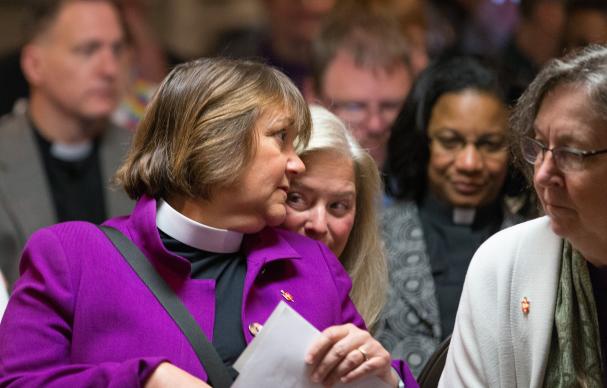With a special session of the General Conference set to take place in February 2019, the United Methodist Church stands poised either to embrace or to turn away from a future of equality for all its members. At this historic moment, Methodists in New Directions and the Queer Clergy Caucus of the New York Annual Conference invite the individual laity and clergy members of the annual conference and each of our individual congregations to take a stand in support of full and equal inclusion of all persons, regardless of gender identity or sexual orientation, in the life of our church.
As a way of encouraging individuals and congregations to take such a stand we are circulating A Covenant of Conscience, originally published in 2011, with an updated preamble. The updated language follows.
You can download a printed version of the 2018 revised Covenant to sign and return to MIND here.
A Covenant of Conscience
Published October 17, 2011, With updated Preamble January 1, 2018
Preamble:
In February 2019, a Special General Conference of the United Methodist Church will convene to discern A Way Forward for our church with regard to the inclusion or exclusion of LGBTQI+ persons. After long struggle, and in a defining moment in our history, each of us, as United Methodist lay persons or clergy, and each of our congregations face an inescapable challenge: where do we stand?
The stand taken by the New York Annual Conference is clear: “our way forward is the way of a just, inclusive, loving church that embraces the full spectrum of the children of God. We seek to embody the beloved community of hope by openly and joyfully affirming the lives and loves of all United Methodists, regardless of sexual orientation or gender expression.” (2016 NYAC Resolution, A Way Forward Together).
While the rite of Christian marriage officiated by our clergy and celebrated in our church buildings is now denied by UMC law to same-sex couples, the New York Annual Conference urges its clergy “to minister equally to all members of their churches and to consider the conference’s call to inclusive ministries in deciding how to honor their congregants’ covenantal commitments.” (2010 NYAC Resolution,Ministering to All in Covenantal Relationships)
And while gifted LGBTQI+ clergy and candidates face exclusion and are subject to complaint and even to trial in the United Methodist Church, the New York Annual Conference Board of Ordained Ministry and the New York Annual Conference have declared that “lesbian, gay, bi-sexual, transgender, questioning, intersexed, and straight candidates will be given equal consideration and protection in the candidacy process.” (2016 NYAC Resolution, Celebrating the Journey to Equality)
By remaining silent in these matters, we offer tacit consent to the injustice done to LGBTQI+ persons in the church. This a critical moment for United Methodist to declare to the world our conviction that pastoral care and the sacraments and rituals of the church are means of grace by which the lives of all Christians are blessed by God, and that therefore we, as congregations and as individual lay persons and clergy, declare our commitment to offer such means of grace to all persons on an equal basis.
By adding our individual names and the names of our congregations to this public covenant, we affirm our commitment to the pastoral care of all persons. We commit ourselves to “a just, inclusive, loving church that embraces the full spectrum of the children of God.” We simply refuse to discriminate against any individual on the basis of sexual orientation or gender identity as we make this covenantal commitment:
We, United Methodist clergy, in accordance with our ordination vows to “seek peace, justice, and freedom for all people,” commit to marrying all people, regardless of sexual identity or gender expression, who seek the blessing of the church, without bias or discrimination.
We, United Methodist laity, in accordance with our membership vows to “resist evil, injustice, and oppression in whatever forms they present themselves,” commit to supporting our clergy in faithfully ministering to all, including through any consequences of their living fully into that duty.
We, united Methodist congregations, refuse to discriminate in the sacraments and rituals provided to our members and pledge the full and equal use of our facilities as we welcome and celebrate equally all couples and the families they may choose to create.
Further, each of us, clergy, laity, and congregations, pledge to one another our spiritual and material support in fulfilling this covenant of conscience.




